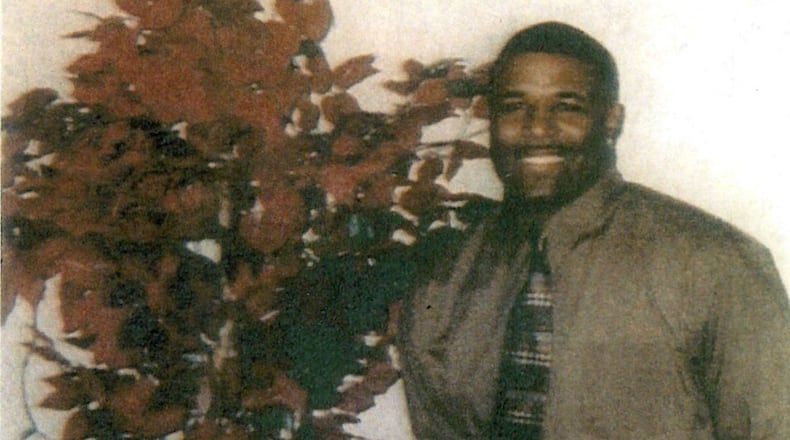In 2023, Danyel Smith turned down a chance at freedom.
Convicted 20 years earlier in the shaken-baby death of his 2-month-old son, Chandler, he would have been allowed to walk out of prison in exchange for a guilty plea. But Smith rejected the deal offered by Gwinnett County prosecutors, saying he refused to “admit to something he did not do.”
Smith, who was sentenced to life in prison, could get a new trial as Georgia’s highest court considers the case.
Smith’s attorneys and experts who reviewed Chandler’s medical records suggest the child likely died from natural causes brought on by seizures and his premature birth, not violent shaking. They asked the Georgia Supreme Court on Tuesday for a new trial. Prosecutors asked the court to uphold the conviction.
Four dozen forensic experts and the Georgia Association of Criminal Defense Lawyers urged the Georgia Supreme Court to hear Smith’s appeal for a new trial, saying the 49-year-old Gwinnett man was convicted on “outdated and unreliable” evidence.
Smith’s case is among a number of convictions embroiled in a national debate over shaken-baby syndrome. There have been numerous exonerations because scientific advances have led to a major shift in how the medical community diagnoses the condition, which is now called abusive head trauma.
“When the diagnosis was made, shaken baby syndrome was approached through a certain diagnostic lens, and that is something that has changed over the past two decades,” Smith’s attorney, Mark Loudon-Brown said. “Applying that new diagnostic approach is what constitutes new evidence that entitles him to a new trial.”
Loudon-Brown, a senior attorney in the Southern Center for Human Rights’ capital litigation unit, called his client’s rejection of the state’s offer of time-served “extraordinary.”
“We took the plea to him and counseled him about it and there was no flinching,” he said. “He was never going to admit to something that he didn’t do.”
Gwinnett prosecutors still contend Chandler’s brain injuries were consistent abuse and said “it is even more certain today” that the infant died from trauma inflicted by his father.
“A seizure could not have accounted for the victim’s injuries in this case,” the DA’s office wrote in its brief, saying Chandler’s scans showed brain injuries and bleeding consistent with shaking.
Managing Assistant District Attorney Chris DeNeve argued Tuesday that some of the defense’s experts gave “unreliable testimony” last year and said a Gwinnett judge was right to deny a new trial.
“We’re definitely challenging aspects of their testimony,” DeNeve said, urging the court to uphold the judge’s decision.
After seven days in the hospital without any signs of brain function, Chandler was taken off life support May 6, 2002. An examination of the child’s body revealed abdominal bruising, and the prosecution’s witnesses at trial said fractures to both of Chandler’s wrists were indicative of abuse. Smith testified he never harmed his son. However, the child’s mother, Marsha Brandon, would have testified last year that she witnessed acts of prior abuse by Smith, according to a brief by prosecutors.
The high court is reviewing a Sept. 25 order signed by retired Superior Court Judge Ronnie Batchelor denying Smith’s request for a new trial. Justices will determine whether Batchelor applied “the appropriate legal framework for deciding extraordinary motions for new trial like Smith’s that are based on new expert analysis of existing physical evidence.”
Batchelor’s 30-page order, which Smith’s lawyers said was replete with grammatical errors and “clearly erroneous factual determinations,” was written by Gwinnett prosecutors and signed by the judge.
Credit: TNS
Credit: TNS
Tuesday’s arguments marked the second time the case has come before the Georgia Supreme Court. In 2022, Batchelor, signing another order prepared by the DA’s office, denied requests by Smith’s attorneys for a hearing that would include new expert testimony suggesting there were factors other than violent shaking that could have caused Chandler’s death.
“We’ve been here once before on an order that was drafted essentially by the state,” Loudon-Brown said.
In the previous appeal, the court reversed the judge’s decision and ordered that a hearing be held to consider new evidence in the case. Batchelor held the hearing last year, which included testimony from both defense and prosecution experts, before denying Smith’s request for a new trial.
Justice Charles Bethel asked whether Smith’s defense team had the burden of showing there was no abuse or simply demonstrating an alternate theory to explain the findings.
Loudon-Brown argued a trial held today would look “fundamentally different” than the one that resulted in Smith’s murder conviction 22 years ago. Even the state’s own medical examiner now concedes that Chandler’s skull fracture could have occurred at birth, Loudon-Brown told the court.
“At a new trial, a juror would have reasonable doubt about Mr. Smith’s guilt,” he said.
About the Author
Keep Reading
The Latest
Featured




